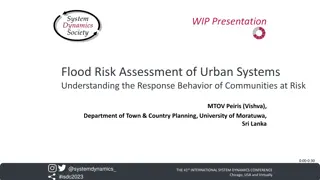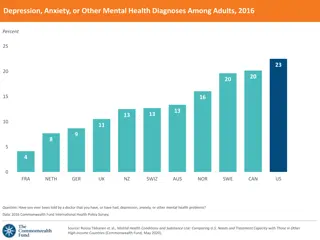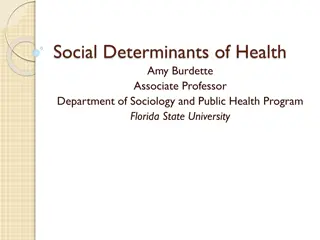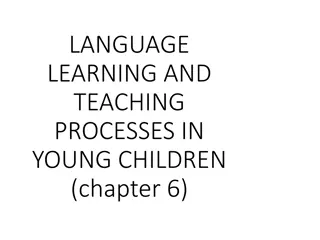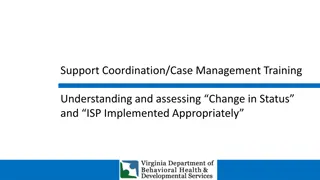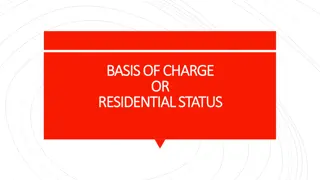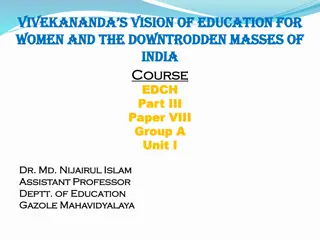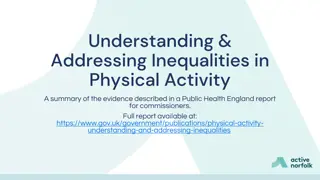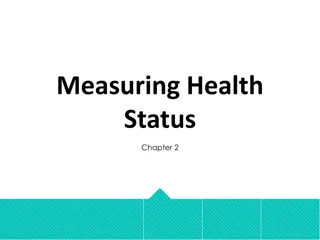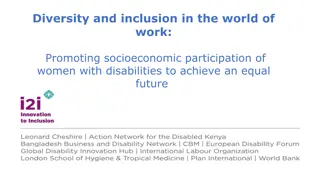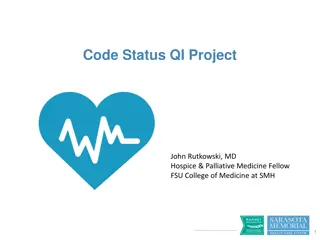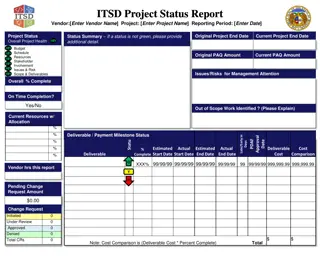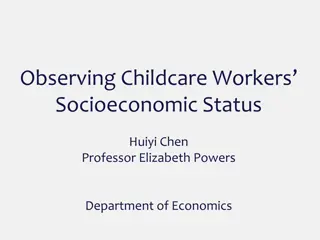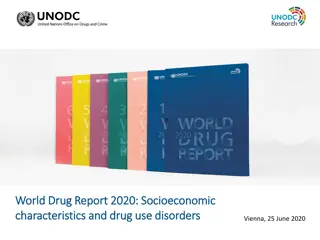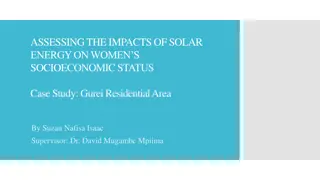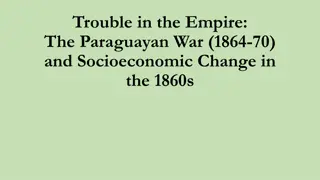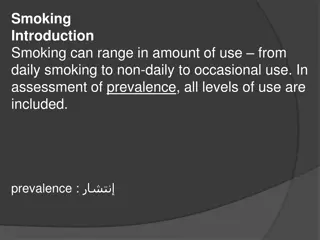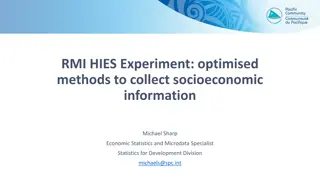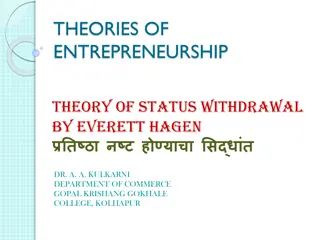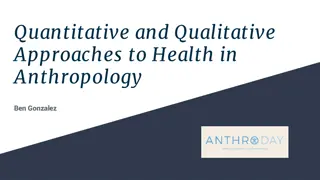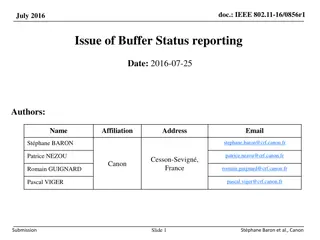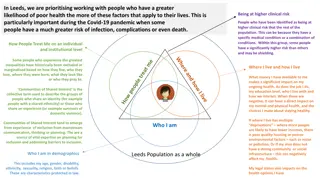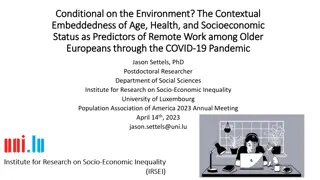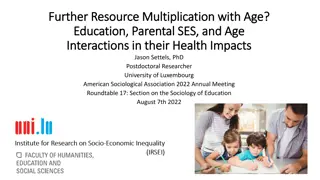Financial hardship and the economic burden of health [cancer] care
The financial hardships and economic burdens faced by individuals in cancer care, highlighting the impact of socioeconomic status and household financial insecurity. It also explores the association between financial hardship and various health outcomes.
1 views • 19 slides
Understanding Urban Flood Risk and Community Response Behavior
Flood risk assessment in urban systems involves complex interactions among natural, physical, and social elements. Factors such as population vulnerabilities, disparities in socioeconomic status, and post-disaster recovery challenges impact how communities respond to flood events. This research expl
3 views • 4 slides
Impact of Socioeconomic Factors on Childhood Development
Children's development and academic success are influenced by socioeconomic factors, as highlighted in a recent study. The research reveals disparities in access to resources and opportunities among children, impacting their educational outcomes and overall well-being. Initiatives like the Youth Edu
3 views • 43 slides
Detailed Status and Plans of MEBT BPM Stripline Project
This document outlines the detailed status and plans for the MEBT BPM Stripline project, including the 3D electromagnetic and mechanical design status, prototype fabrication process, RF measurements, magnetic checks, and production plan for required pieces. It also covers verifications and tests suc
0 views • 6 slides
Mental Health Insights Among High-Income Countries Adults in 2016
Explore the prevalence of depression, anxiety, emotional distress, and socioeconomic needs among adults in high-income countries based on the 2016 Commonwealth Fund International Health Policy Survey. The data highlights the rates of mental health diagnoses, subjective experiences of emotional distr
1 views • 10 slides
Understanding Social Determinants of Health
Chronic conditions like heart disease and cancer have multiple causes, not all biological. Social epidemiology studies the social distribution of health, morbidity, and mortality risk influenced by social status and conditions. Factors such as age, gender, race, socioeconomic status, and social cond
0 views • 32 slides
Language Learning and Teaching Processes in Young Children
Development of language in young children is influenced by various factors such as their cultural and linguistic environment, unique characteristics, and interactions with adults. Optimal language development requires language stimulation from the environment. Varied cultural practices impact langua
1 views • 51 slides
Understanding Trauma and Stress-Related Disorders: A Comprehensive Overview
Trauma and stress-related disorders encompass maladaptive responses to severe stress, affecting social functioning. This article delves into classifications, specifically PTSD, emphasizing clinical presentation and management. It explores ICD-10 and ICD-11 coding, defining PTSD and its essential fea
0 views • 30 slides
Understanding Change in Status & ISP Training for Support Coordinators
This training focuses on ensuring Support Coordinators understand and apply the critical concepts of change in status and ISP implementation appropriately. Supervisors play a key role in supporting SCs in this process. By the end of the training, participants will be able to identify, assess, docume
0 views • 45 slides
Understanding Residential Status for Income Tax Purposes
Tax is levied on the total income of an individual based on their residential status as per the Income-tax Act, 1961. The Act classifies assessable persons into Ordinary Resident, Resident but not Ordinarily Resident, and Non-Resident. Residential status is determined by the physical presence of an
0 views • 26 slides
Vision of Education for Women and the Underprivileged Masses in India by Swami Vivekananda
Swami Vivekananda emphasized the importance of education for women and the underprivileged masses in India. He believed in character-building, empowerment, and holistic education to uplift society. Vivekananda's vision advocated for providing education to all members of society, regardless of their
0 views • 12 slides
Addressing Inequalities in Physical Activity: Summary of Evidence
This report highlights research by the University of Derby on inequalities in physical activity among different demographic groups. Findings show disparities in PA levels that require immediate action to address. Health is influenced by various factors, including genetics, lifestyle, environment, ac
0 views • 19 slides
Understanding Health Status Indicators and Measurements
Health status indicators play a crucial role in assessing overall health status at individual, group, and population levels. These measurements, such as self-assessed health status and life expectancy, provide valuable insights for governments to identify trends, enact appropriate interventions, and
2 views • 18 slides
Promoting Socioeconomic Participation of Women with Disabilities for an Equal Future
In the world of work, diversity and inclusion play crucial roles in promoting socioeconomic participation of women with disabilities to achieve an equal future. This webinar focuses on understanding the gender dynamics, power relations, and barriers faced by women and men with disabilities in econom
0 views • 20 slides
Understanding Social Gradients in Health and Socioeconomic Status
This presentation delves into the complexities of social gradients in health and socioeconomic status, highlighting the impact of indicators such as employment status, education, poverty, and housing tenure. It emphasizes the need to reassess indicators used for determining socioeconomic status and
2 views • 7 slides
Enhancing Code Status Discussions in End-of-Life Care: A Quality Improvement Project
This project led by Dr. John Rutkowski aims to reduce inappropriate interventions for patients with DNR or Modified Code Status by implementing an improved code status documentation system. Data analysis reveals a need for better documentation practices, and survey responses highlight various challe
0 views • 18 slides
Impacts of Work-Based Learning on Vulnerable Youth in Vocational Education
Work-based learning (WBL) is recognized as a catalyst for change in vocational education for vulnerable youth, providing them with a second chance and breaking barriers to access opportunities. WBL, including work experience, virtual experiences, and industry connections, serves as a protective fact
1 views • 14 slides
Comprehensive Guide to Multiple Multinomial Logistic Regression with Dr. Heini V.
Learn about multinomial logistic regression models with multiple explanatory variables, including model selection, likelihood ratio tests, and Wald tests. Explore an example on the association between economic activity, gender, age, and marital status. Understand the distribution of variables like e
0 views • 17 slides
Addressing Harassment Within Rotary District 6440
Rotary District 6440 is dedicated to maintaining a harassment-free environment at meetings and events. This commitment includes policies and guidelines, training for leadership positions, and establishing a committee to tackle harassment issues. The district is focused on preventing unwanted physica
0 views • 16 slides
Assessment of Computer and Information Literacy Study in Chile
The International Computer and Information Literacy Study (ICILS) conducted in Chile by the Educational Quality Assurance Agency revealed that Chilean students scored below the international average, with girls outperforming boys. Socioeconomic status also had a significant impact on Computer and In
0 views • 13 slides
ITSD Project Status Report - Vendor & Project Overview
This ITSD Project Status Report provides a comprehensive update on the current status of a specific project, including health, scope, deliverables, budget, schedule, resources, stakeholder involvement, issues, risks, completion percentage, on-time completion status, out-of-scope work, milestone stat
0 views • 10 slides
Examining Socioeconomic Status of Childcare Workers in Illinois
Childcare workers in Illinois earn a median hourly wage of $10.5, ranking 35th in hourly wages among 730 occupations. The study aims to understand the flexibility and demographics of childcare workers compared to other occupations with similar wages. Assumptions suggest childcare work is predominant
0 views • 11 slides
Impact of Socioeconomic Conditions on Drug Use Disorders: Insights from World Drug Report 2020
The World Drug Report 2020 highlights the strong correlation between socioeconomic factors and drug use disorders. Studies reveal that communities facing poverty, violence, and social inequality are at a higher risk of drug overdoses and addiction. Factors like income inequality, lack of social capi
1 views • 17 slides
Understanding Peptic Ulcers: Causes, Prevalence, and Treatment
Peptic ulcers are circumscribed ulcerations in the gastrointestinal mucosa, commonly caused by Helicobacter pylori infection. They have a higher prevalence in developing countries and are associated with factors like socioeconomic status, poor hygiene, and genetic links. While peptic ulcers naturall
0 views • 54 slides
Impacts of Solar Energy on Women's Socioeconomic Status: Case Study in Gurei Residential Area
Globally, women face challenges due to lack of access to modern energy, impacting their socioeconomic status. This research in Gurei, South Sudan, aims to assess the effects of solar energy on women's lives, addressing issues of clean energy access, cultural barriers, and women's involvement in the
0 views • 7 slides
Crafting a Thesis on American Culture through The Plastic Pink Flamingo
Analyzing Jennifer Price's essay, The Plastic Pink Flamingo, reveals how she juxtaposes different elements in American society to critique superficiality and the trade-off of natural beauty for status symbols. Price's crafting of contrasts between socioeconomic levels, geographic areas, and treatmen
0 views • 10 slides
Machine Status Update Meeting with Rob Ainsworth on 31st March 2017
Update on machine status meeting with Rob Ainsworth at 9 o'clock on 31st March 2017 includes various topics such as RR activities, downtime, MI machine status, Numi power status, issues, and upcoming tasks. Multiple images show detailed information regarding RR machine status updates, downtime repor
0 views • 7 slides
Socioeconomic Transformations and the Legacy of the Paraguayan War (1864-70) in Brazil
The content delves into the turbulent times of the Paraguayan War and its aftermath in Brazil during the 1860s. It explores the socioeconomic changes, political dynamics, and demographic shifts that shaped the era, highlighting the impact of the war on Paraguay and the region. The narrative unfolds
0 views • 12 slides
The Impact of Smoking on Public Health in the UK
Smoking, ranging from daily to occasional use, remains a significant public health concern in the UK. Despite declining rates, tobacco use still causes thousands of premature deaths annually. Various factors such as socioeconomic status and gender influence smoking prevalence. The Department's tobac
0 views • 23 slides
Optimised Methods for Collecting Socioeconomic Information in the Pacific Region
This presentation explores the optimised methods used in the Republic of the Marshall Islands Household Income and Expenditure Survey (RMI HIES) to collect socioeconomic data. It covers the objectives and history of HIES in the Pacific, the standardised methodology implemented since 2012, and detail
0 views • 57 slides
MODIS and VIIRS Product Status Overview - May 2023
The MODIS and VIIRS Product Status for May 2023 discusses the current processing status of MODIS and VIIRS data, reprocessing plans, algorithm changes, geolocation updates, and upcoming activities of the science team meetings. Key points include the forward processing status, C7 reprocessing plan, V
0 views • 6 slides
Theory of Status Withdrawal in Entrepreneurship by Everett Hagen
Theory of Status Withdrawal in Entrepreneurship by Everett Hagen explores how individuals in a social group may experience status withdrawal when their values are not respected by other groups. Hagen identifies triggers and reactions to status withdrawal, showcasing examples like the samurai communi
0 views • 9 slides
How to Confirm Transferred Out Learner and Ensure Proper Status Update
Learn the steps to confirm if a learner has transferred out and update their status accordingly. Follow the process of determining if the learner has already transferred to another school, confirming the transfer out status, updating records, and checking for status changes. These instructions provi
0 views • 7 slides
Cross-National & Cross-Cultural Risk Factors for Offending
Explore key risk factors for offending across nations & cultures, analyzing homicide rates, structural differences, individual/family factors, and the generalizability of crime risk factors. Learn about findings related to impulsivity, achievement, conduct problems, family supervision, parenting sty
0 views • 13 slides
Approaches to Health Disparities in Anthropology: Quantitative vs. Qualitative Methods
Exploring health in anthropology involves various factors like social, cultural, biological, and linguistic influences. This content delves into the quantitative research on disparities in health insurance coverage, particularly focusing on Latino vs. white respondents in Texas. The study utilized l
0 views • 13 slides
Efficient UL Buffer Status Reporting in IEEE 802.11 Networks
IEEE 802.11-16/0856r1 discusses the importance of UL buffer status reporting in 11ax for efficient resource allocation. The document addresses managing unmanaged P2P flows to enhance buffer status reporting accuracy. It proposes solutions to prevent misallocation of resources due to large data amoun
0 views • 11 slides
Understanding Health Inequalities and Communities of Shared Interest in Leeds
In Leeds, a focus is placed on addressing health inequalities by working with individuals who are at higher risk due to various factors impacting their lives. These factors include medical conditions, socioeconomic status, living conditions, and more, which can greatly influence overall health outco
0 views • 4 slides
Conditional on the Environment? The Contextual Embeddedness of Age, Health, and Socioeconomic Status as Predictors of Remote Work among Older Europeans through the COVID-19 Pandemic
This study delves into how the COVID-19 pandemic has influenced remote work patterns among older Europeans, focusing on the interaction between age, health, socioeconomic status, and contextual factors. It explores the impact of government restrictions, education, income, age, and health on the abil
0 views • 24 slides
Understanding Social Class in Sociology
Social class, also known as class, refers to a group of individuals in a society who share similar socioeconomic status. The concept of class plays a crucial role in social theory, influencing social mobility and census data. From early theories by political philosophers like Hobbes to Marx's influe
0 views • 17 slides
Understanding Health Impacts of Education, Parental SES, and Age Interactions
This research explores the complex interplay of socioeconomic status, education, parental SES, and age in influencing health outcomes. Discussions on resource substitution vs. multiplication and how age moderates these dynamics are highlighted. Previous studies suggest age may play a role in the hea
0 views • 21 slides
![Financial hardship and the economic burden of health [cancer] care](/thumb/779/financial-hardship-and-the-economic-burden-of-health-cancer-care.jpg)
